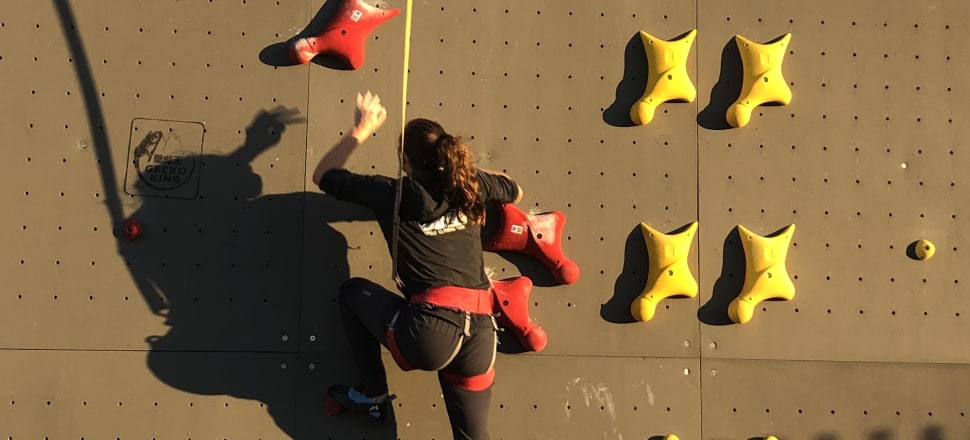
This month, New Zealand’s first speed climbing team departs on an international competition tour, sights set on the World Championships.
Few competitive sports can match speed climbing’s blink-and-you-miss-it efficiency. The sport, fresh from its 2021 Olympic debut, has athletes race to the top of a 15-metre vertical wall, standardised to be identical the world over. It takes just a handful of critical seconds. For 23-year-old speed champion Sarah Tetzlaff, that familiar upward sprint is almost musical. Her mid-climb inner monologue is focused, sparse, and deeply ingrained in muscle memory.
“What's going through my head when I'm on the wall – sometimes, it’s not much at all,” Tetzlaff says. “Other times, it'll just be little words, like ‘now!’” Distant phrases may flash through her head – the word “ladder” at the section of the wall that reminds her of wooden rungs, a rhythmic “push-push” at the double-left-foot-shove, or, reaching to hit the buzzer at the top of the wall, “SNAP!”
The New Zealand speed climbing team are currently spending six days a week scrambling up the only officially recognised speed wall in the country – at Blake Park in Mount Maunganui. The wall was built in 2020 and for the last year it has hosted the team’s new high-performance programme, led by Coach Rob Moore.
It’s now their final week of training in preparation for a season of overseas competition, which will culminate at the International Federation of Sport Climbing World Championships in Bern, Switzerland.
READ MORE:
* Young climber striving to be faster, higher, stronger
* Family Tree key to Twigg’s fifth Olympic bid
“We run under the philosophy that sprinters need to sprint,” Moore says of the programme. “We’re trying to be as sport-specific as we can.” That means strength training, agility and coordination exercises, and countless sprints up the wall.
The team of six includes three female athletes – Tetzlaff, Abby Gebert, and Jorja Rangi. Training is intense, but all three find its inherent repetition useful. The other two sport climbing disciplines – lead and boulder, which feature varied climbs with and without ropes, respectively – demand a more malleable training process. With speed, the consistent route lets an athlete make microscopic adjustments to each run, rehearsing it towards perfection like a gymnast’s routine.
“A lot of it is just smoothing out each move and practising it over and over,” Rangi says.
Tetzlaff agrees, explaining that while each launch is unique, her feet and hands know exactly where they need to be.
“It's just little micro adjustments. Slightly conscious directions you make if it's not going perfectly, but … every time you hit a hold your fingers engage straightaway,” Tetzlaff says.
The competition season The team will leave in mid-June – first for a World Cup in Villars, Switzerland, then another in Chamonix, France. After a month to regroup and train in Grenoble, the team will race in Bern on August 10.
“I'm super excited to travel,” Gebert says. “We've got a good team and we're gonna have some fun adventures.”
For Gebert, the tour doesn’t end in Bern. From there, she and teammates Julian David and Flynn Chisholm will peel off and head to South Korea for the IFSC Youth World Championships in late August. At 18 years old, this is her final year eligible to compete at Youth Worlds. She’s optimistic about the times she’s running.
“I think this year, I might actually be able to get a decent placing,” Gebert says. But the thrill of competing stands regardless of outcome. “I just really like going fast. Especially in a competition when you’re racing someone. You just gotta go. You can’t think about it.”
“We’re pushing the margin of where you can go further and further. And it won't be pushed like that again.” - Sarah Tetzlaff
Following its Olympic debut in Tokyo two years ago, speed climbing has seen an explosive period of growth. Since then, the world record has fallen rapidly, currently standing at 4.90 seconds for men and 6.25 seconds for women.
Take Reza Alipour Shenazandifard, an Iranian climber, who held the world record for more than three years at 5.48 seconds.
“That was until 2021,” Moore says. “Now, with the development of the sport and how fast everyone's getting, at the last World Cup, he ran that same time, 5.4, and it wasn't even good enough to get him into the semifinal.”
Watch Tetzlaff, left, set a New Zealand record in the video below.
Since the speed wall’s instalment at Mount Maunganui, New Zealand records have tumbled, too. Nearly all of them are held by members of this squad.
“It’s pretty crazy to think that no one's been at this level before in this country, because no one’s had walls to train on before,” Tetzlaff says. Her first experience with speed climbing was in 2017, as a required event for a Youth Olympics Oceania qualifier. She practised on the wall for a few days before the event, and despite being brand new to the discipline, she won in the category. Now, after a year in the new training programme, she holds the New Zealand female record at 9.56 seconds, setting a new one with each personal best.
“We’re pushing the margin of where you can go further and further. And it won't be pushed like that again,” she says. “It’s just a massive privilege because no one else is gonna get this opportunity. And I just happened to be here at the right time in my life.”
Rangi feels similarly. “[We’re] all there in New Zealand at the moment, just our nice little team,” Rangi says. “And yeah, sometimes it's kind of hard to comprehend that we're leading it. We're the first to do this.”
The 2024 Paris Olympics are a distant but tangible goal. The clearest shot at qualification will be at the Oceania Championships in Melbourne this November. For now, the team is focused squarely on the IFSC World Championships, and, as ever, chipping away at their times.
“We're pretty excited that we're on the cutting edge of where everything’s headed,” Moore says. “We’re living and breathing the sport.”







